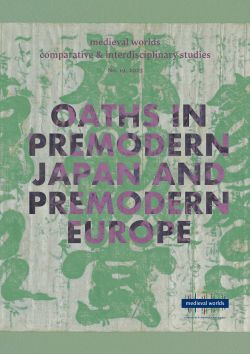Helmut Reimitz
S. 141 - 162
doi:
10.1553/medievalworlds_no19_2023s141
Verlag der Österreichischen Akademie der Wissenschaften
doi:
10.1553/medievalworlds_no19_2023s141
Abstract:
The article explores narratives of the oath in the Histories of the post-Roman Frankish kingdom – the most enduring successor state of the Western Roman Empire – and how they reflect the increasing salience of the oath of fidelity for the constitution of legitimate political authority in that kingdom. It studies the ongoing work on the interpretation and function of the oath of fidelity from the Frankish kingdoms under the Merovingian dynasty (ca. 480-751 CE) to the early Carolingian rulers – from the establishment of the general oath of fidelity as the legitimizing basis of post-Roman rule to its increasing sacralization in the Carolingian period establishing a dualism of fidelity to God and the ruler, as is well documented in the formula fideles Dei et regis. As Paolo Prodi observed some time ago in his study on the Sacrament of Power (Il sacramento del potere), it was in the Carolingian period that the Christian church managed to establish its interpretative prerogative to define how oaths could be linked to claims to power. The study of histories written in the early medieval Frankish kingdom indicates that this was not a steady process of increasing ecclesiastical control over the interpretation of the oath, but should be seen as a more dynamic process in response to the intensified instrumentalization of the dualistic view of the oath by early Carolingian politics.
Oath of fidelity, transformation of the Roman world (West), Frankish kingdoms, Merovingian period, Carolingian period, Gregory of Tours, Chronicle of Fredegar, Continuations of the Chronicle of Fredegar/Historia vel Gesta Francorum (Childebrand, Nibelung), Annales regni Francorum
Published Online:
2023/11/30 10:21:13
Object Identifier:
0xc1aa5576 0x003ea501
Rights:https://creativecommons.org/licenses/by-nc-nd/4.0/
"medieval worlds" provides a forum for comparative, interdisciplinary and transcultural studies of the Middle Ages. Its aim is to overcome disciplinary boundaries, regional limits and national research traditions in Medieval Studies, to open up new spaces for discussion, and to help developing global perspectives. We focus on the period from c. 400 to 1500 CE but do not stick to rigid periodization.
medieval worlds is open to submissions of broadly comparative studies and matters of global interest, whether in single articles, companion papers, smaller clusters, or special issues on a subject of global/comparative history. We particularly invite studies of wide-ranging connectivity or comparison between different world regions.
Apart from research articles, medieval worlds publishes ongoing debates and project and conference reports on comparative medieval research.
In this volume, guest editors Philippe Buc and Thomas D. Conlan use oaths as the pivotal point for their comparative thematic section. Focusing on the differences and similarities between Japanese and European oath-taking and oath-breaking practices during the medieval period, on terminology and on chronology, Philippe Buc provides an introduction that contextualises the studies in this collection. For Japan, Yoshikawa S. and T.D. Conlan give insights into the development of the written oath (kishōmon) from its predecessors and origins in the third to sixth centuries to the sixteenth century, M. Gilbert and Horikawa Y. provide case studies of kishōmon in the heyday of its use. For Western Europe, S. Esders outlines the development of oaths from Late Antiquity to the tenth century under Christian doctrinal influence. In three case studies, H. Reimitz, H. Débax and O. Richard illustrate the use of oaths in the Early, High and Late Middle Ages.
In our individual articles section, E. Worrall, R. Kramer and T. Grant offer a new edition and commented translation of an Icelandic fragment of the Nikuláss saga erkibiskups, the Saga of Bishop Nicholas.




 Home
Home Print
Print
 References
References
 Share
Share
